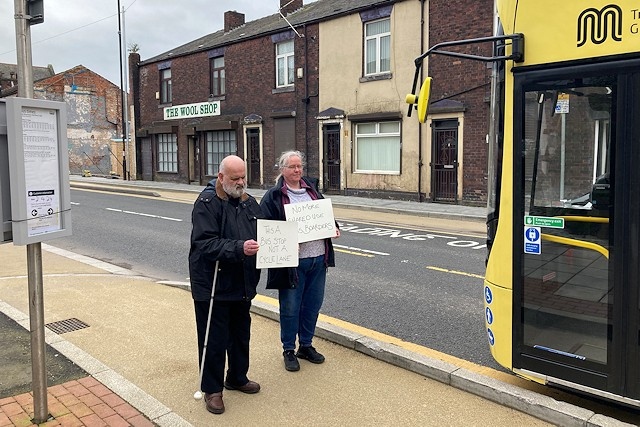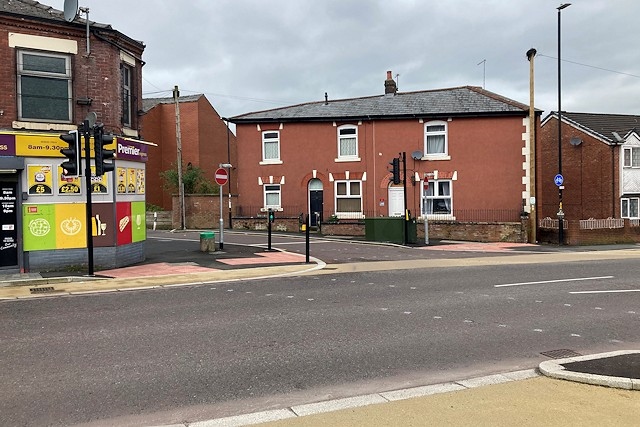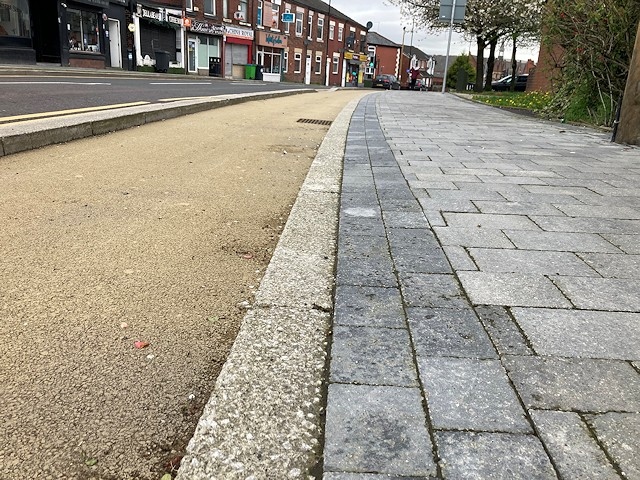Visually impaired campaigners say controversial cycle scheme is unsafe for them
Date published: 27 April 2024

Kevin and Sarah holding up signs as a bus pulls in next to the cycle lane in Castleton
A blind man has labelled the cycle lanes in Castleton as dangerous and discriminatory to the disabled and the partially sighted.
After spending an hour with Rochdale resident Kevin Greenan, he pointed out a number of flaws with the newly completed cycle lane that runs on both sides of Manchester Road in the village of Castleton.
The 69-year-old, one of the three in every hundred people in the UK living with sight loss, called on all council and transport bosses behind the scheme to walk with him blindfolded so they could understand what it was like to walk in his shoes.
The new cycle lane, which opened last month, is part of an active travel scheme funded by Transport for Greater Manchester promoting healthier living and sustainable travel.
The 1km stretch of road has segregated cycle lanes on either side – costing £1.2m. It has proved controversial with local people already due to the traffic issues and the impact on local business.
There are plans to extend it further, all the way to Rochdale town centre under the next phase – which is due to go before the cabinet in the near future. When the ‘Phase 2’ plans were put to a survey in September last year, around 70 per cent of those that responded opposed the plans.
Read more: The £9m cycle scheme set to be approved… but locals aren’t keenPublished: 18 March 2024
The issue Kevin has with the new cycle lanes is not against cyclists, or the scheme’s connection to sustainable travel via the Bee Network launch – he just feels the design poses a risk to his safety.
As it is, he says he would not feel safe simply trying to get on a bus to travel – because of the risk of getting hit by a cyclist if he steps out into the lane to approach a bus, and because of the trip hazard presented by high kerb of the segregated lane.
“The problem here is that if I want to get a bus, when I’m standing at the bus stop, there is a cycle lane between me and where I would get onto the bus,” Kevin explained. “What I need is for the bus to pull into the kerb, but obviously at the moment that can’t happen.
“I’ve got to cross the cycle lane to get to the bus. It’s dangerous, it’s unacceptable to me. It’s already stressful enough for me to travel, and this adds stress.
“If a bicycle comes and hits me, because not every cyclist stops, who is responsible? It is so dangerous and it has got to be stopped.
“I challenge any councillor to walk with me blindfolded, if they were willing, and realise the problem. I want us to sing from the same hymn sheet so we can get buses back to the kerb where they belong.”
Just walking along the street Kevin, who has joined forces with National Federation of the Blind UK (NFBUK) campaigner Sarah Gayton, talks the Local Democracy Reporting Service through all the hazards he faces simply trying to travel through Castleton.
He described the demarcation on the edges of the pavement that meets the cycle lane as “impossible” as he said he would have no clue there was a cycle lane coming up if he was not told previously.
Walking back from the train station towards the library, he claims there are subtle trip hazards on the pavement where it has been adapted for the new cycle lane including loose brickwork and no indent to indicate the end of the pavement.
But the biggest danger Kevin pointed out during the short walk was at the junction where Manchester Road meets Partington Street and Royle Barn Road. Here the crossing has been adapted to diagonal shape.
Sarah from NFBUK explained that blind people are trained to walk straight when crossing the road at traffic lights, so when Kevin crossed at the diagonal section, he found himself wandering into the middle of Partington Street rather than the pavement adjacent to Manchester Road – potentially a very dangerous position for him to be in.

“At present I would not feel safe travelling on my own. In the past I had no problem going out on my own and getting on and off buses because they would pull right into the kerb,” Kevin said.
“Now with this redesign, this whole travel situation is a lot more difficult. If I didn’t have someone with me, I would feel intimidated, I would not feel happy at all.
“I can’t depend on someone being there, which then impacts my independence. Independence is vital to me, without it I would be completely isolated and I don’t want to be isolated.
“I’ve been isolated over the last few years (because of Covid) as we all have, but I need to get back on track and get out. It’s great if I can get on a bus and get to Rochdale, Manchester anywhere that would be great.
“The Bee Network is a wonderful and important thing. Manchester has become nationalised again, which is great. But if the transport system is to work, I have to be able to use it, otherwise it doesn’t work.”
In response to criticism of the design, a spokesperson for TfGM said: “We have been made aware of the recent concerns raised by the National Federation of the Blind UK about the Castleton Phase 1 active travel scheme.
“During the scheme development and delivery, TfGM has worked with Rochdale Council to ensure the scheme meets regional and national accessibility guidelines. However, we recognise that once a scheme has been built, there may be issues that come to light through people’s practical experience of using it and we will be discussing some of the issues raised with our colleagues at Rochdale Council.
“As we build the integrated Bee Network, we want to make sure that walking, wheeling and cycling infrastructure and the links to public transport are accessible for everyone.”
How can the problem be resolved?
Currently Kevin says, drivers shout out the bus number to blind passengers. He suggests that they could also urge approaching passengers to mind the kerb.
However, this is an imperfect solution for Kevin as he is hearing impaired as well as completely blind, so could miss the instructions.
According to Sarah from NFBUK, removing bits of the kerbs where buses would stop and straightening up the crossing would be the safest course.
Sarah Gayton said: “It is quite easy to remediate and solve the problem because that kerb (pointing at the kerb between the bus stop and where the bus would actually stop) can be taken out (preventing a trip hazard to the blind). The kerb can be lifted in the matter of a day.
“They could put a sign up telling cyclists to stop if a bus is coming. This is not safe, it is discriminatory for blind and disabled people.”

Sarah went on to explain that a human rights ruling in Vancouver, Canada ruled against a ‘floating’ bus stop which was deemed to discriminate against blind people. The 2020 tribunal upheld the complaint lodged by Oriano Belusic, vice-president of the Canadian Federation of the Blind, who found a similar case in the area where people had to cross a cycle lane to catch a bus – just like in Castleton.
Sarah’s concern is that this cycle lane design would be rolled out in other areas of Greater Manchester and cause problems for more people with visual impairments or disabilities. That is why she wants to take action now.
Sarah also claims that TfGM and the council were provided with NFBUK evidence against this cycle lane design when it was first mooted back in 2018, but that Kevin and her were not consulted further.
The feeling of being ignored is nothing new with the public when talking about this scheme – as local objectors also believe their voices have gone unheard. The plan was first introduced way back in 2018 by the then Transport Commissioner for Greater Manchester Chris Boardman.
Although there is optimism about what this scheme can do for boosting healthier lifestyles, some residents blame the disruption caused by it for closing local business and felt that there was already a viable cycle route down the canal.
Kath Dennerley has been campaigning against this scheme for years and explained that a meeting with GM mayor Andy Burnham and Active Travel Commissioner Dame Sarah Storey last November saw residents share their deep concerns about issues in the village and asked what plans there were to assist local business owners. At the time, Mr Burnham said that there was no obligation to provide funding but would look into the issue.
A follow up meeting on March 20 saw a similar reception to the scheme, but this time Mr Burnham made a commitment to visiting businesses, looking at investment and upgrades to support local business.
In spite of the opposition, the council’s cabinet was due to approve £9,143,800 for the extension of the cycle lane from the Mayor’s Challenge Fund on March 19 this year. But on the day itself, the council decided to delay their decision pending more consultation.
That decision came after the LDRS reported on the continuing opposition in the area – although the reasons behind the decision for further consultation aren’t known. Nonetheless, it’s still expected the scheme will go ahead following approval at a future cabinet meeting.
The continuation of the plan aims to regenerate street spaces, create segregated cycle lanes and upgrade major junctions on the A58-Manchester Road.
Phase two would mainly see the continuation of the segregated cycleways alongside junction improvements, crossing upgrades, and two 20mph zone sections along Manchester Road. The idea behind these plans is to create safer ways for pedestrians and cyclists to get to busier parts of the borough which coincide with the Bee Network infrastructure coming in.
Mark Robinson, director of economy and place at Rochdale Borough Council, said: “The Castleton scheme was designed according to national guidance, which is issued by the Department for Transport, and used by all local authorities. The designs were also approved by Transport for Greater Manchester.
“The engagement exercise, which took place before work started on site, was promoted in the media and on social media and more than 6,500 leaflets were sent to individual homes and businesses in and around the scheme area.
“We will be undertaking a Stage 3 Road Safety audit of this scheme at a future date and will act on any relevant findings, if required.”
George Lythgoe, Local Democracy Reporter
Do you have a story for us?
Let us know by emailing news@rochdaleonline.co.uk
All contact will be treated in confidence.
Most Viewed News Stories
- 1Off-licence found with weapons and drugs punished by council
- 2Police appeal for further witnesses to incident in Queen's Park
- 3Local veterans’ charity receives big support from national logistics companies
- 4Rochdale community group founder recognised for contribution to research engagement with South...
- 5Milnrow schoolgirl cleans up streets with school litter-picker – and hopes to inspire others to do...
To contact the Rochdale Online news desk, email news@rochdaleonline.co.uk or visit our news submission page.
To get the latest news on your desktop or mobile, follow Rochdale Online on Twitter and Facebook.


